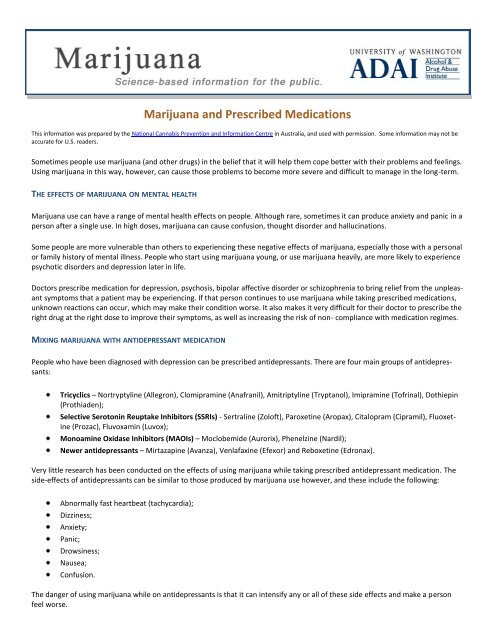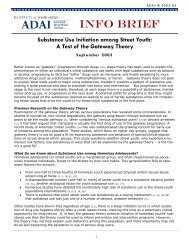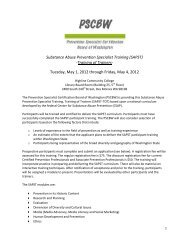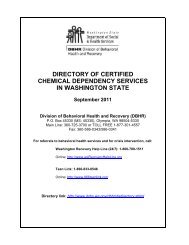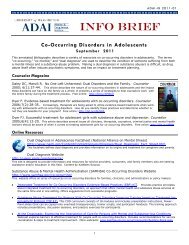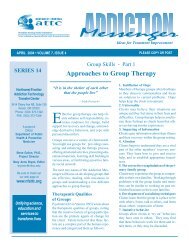Marijuana and Prescribed Medications - Alcohol and Drug Abuse ...
Marijuana and Prescribed Medications - Alcohol and Drug Abuse ...
Marijuana and Prescribed Medications - Alcohol and Drug Abuse ...
You also want an ePaper? Increase the reach of your titles
YUMPU automatically turns print PDFs into web optimized ePapers that Google loves.
<strong>Marijuana</strong> <strong>and</strong> <strong>Prescribed</strong> <strong>Medications</strong><br />
This information was prepared by the National Cannabis Prevention <strong>and</strong> Information Centre in Australia, <strong>and</strong> used with permission. Some information may not be<br />
accurate for U.S. readers.<br />
Sometimes people use marijuana (<strong>and</strong> other drugs) in the belief that it will help them cope better with their problems <strong>and</strong> feelings.<br />
Using marijuana in this way, however, can cause those problems to become more severe <strong>and</strong> difficult to manage in the long-term.<br />
THE EFFECTS OF MARIJUANA ON MENTAL HEALTH<br />
<strong>Marijuana</strong> use can have a range of mental health effects on people. Although rare, sometimes it can produce anxiety <strong>and</strong> panic in a<br />
person after a single use. In high doses, marijuana can cause confusion, thought disorder <strong>and</strong> hallucinations.<br />
Some people are more vulnerable than others to experiencing these negative effects of marijuana, especially those with a personal<br />
or family history of mental illness. People who start using marijuana young, or use marijuana heavily, are more likely to experience<br />
psychotic disorders <strong>and</strong> depression later in life.<br />
Doctors prescribe medication for depression, psychosis, bipolar affective disorder or schizophrenia to bring relief from the unpleasant<br />
symptoms that a patient may be experiencing. If that person continues to use marijuana while taking prescribed medications,<br />
unknown reactions can occur, which may make their condition worse. It also makes it very difficult for their doctor to prescribe the<br />
right drug at the right dose to improve their symptoms, as well as increasing the risk of non- compliance with medication regimes.<br />
MIXING MARIJUANA WITH ANTIDEPRESSANT MEDICATION<br />
People who have been diagnosed with depression can be prescribed antidepressants. There are four main groups of antidepressants:<br />
Tricyclics – Nortryptyline (Allegron), Clomipramine (Anafranil), Amitriptyline (Tryptanol), Imipramine (Tofrinal), Dothiepin<br />
(Prothiaden);<br />
Selective Serotonin Reuptake Inhibitors (SSRIs) - Sertraline (Zoloft), Paroxetine (Aropax), Citalopram (Cipramil), Fluoxetine<br />
(Prozac), Fluvoxamin (Luvox);<br />
Monoamine Oxidase Inhibitors (MAOIs) – Moclobemide (Aurorix), Phenelzine (Nardil);<br />
Newer antidepressants – Mirtazapine (Avanza), Venlafaxine (Efexor) <strong>and</strong> Reboxetine (Edronax).<br />
Very little research has been conducted on the effects of using marijuana while taking prescribed antidepressant medication. The<br />
side-effects of antidepressants can be similar to those produced by marijuana use however, <strong>and</strong> these include the following:<br />
Abnormally fast heartbeat (tachycardia);<br />
Dizziness;<br />
Anxiety;<br />
Panic;<br />
Drowsiness;<br />
Nausea;<br />
Confusion.<br />
The danger of using marijuana while on antidepressants is that it can intensify any or all of these side effects <strong>and</strong> make a person<br />
feel worse.
<strong>Marijuana</strong>: Science-Based Information - Factsheet - <strong>Marijuana</strong> <strong>and</strong> <strong>Prescribed</strong> <strong>Medications</strong><br />
MIXING MARIJUANA WITH ANTIPSYCHOTIC MEDICATION<br />
Antipsychotic medication is prescribed for people who have had psychotic episodes <strong>and</strong> have been diagnosed with schizophrenia.<br />
Common antipsychotic medications used in Australia are:<br />
Antipsychotic <strong>Medications</strong> (older medications) – Chlorpromazine HCl (Thorazine), Thioridazine HCl (Mellaril), Haloperidol<br />
(Haldol);<br />
Atypical Antipsychotic <strong>Medications</strong> (newer medications) – Olanzapine (Zyprexa), Resperidone (Risperdal), Clozapine<br />
(Clozaril), Quetiapine (Seroquel).<br />
Antipsychotic medications are most effective in treating the hallucinations <strong>and</strong> delusions associated with schizophrenia <strong>and</strong> other<br />
psychotic disorders, however they may not help with other symptoms such as motivation <strong>and</strong> emotional responsiveness. Because<br />
of this, people with schizophrenia can experience depression which may also need to be treated. All these symptoms are made<br />
worse if marijuana is being used.<br />
Research suggests that counselling can greatly improve the chances of a person giving up or cutting down their marijuana use<br />
while taking medication.<br />
While there is very little research on the effects of the combination of marijuana <strong>and</strong> antipsychotic medications, there is evidence<br />
that suggests that those people prescribed Clozopine experience less craving for marijuana than those who are prescribed<br />
Resperidone or Quetiapine. Further research into this area is being conducted.<br />
GETTING HELP<br />
If you use marijuana regularly <strong>and</strong> take prescribed medications, or know someone who does, the following things may help:<br />
Make sure the prescribing doctor is aware of the marijuana use <strong>and</strong> how much is being used.<br />
See a specialised counsellor – it greatly improves the chances of decreasing or stopping marijuana use while taking medication.<br />
Give the medication a chance – it can take up to six weeks for antidepressant <strong>and</strong> antipsychotic medications to take effect.<br />
Be aware that if marijuana is taken with antidepressants, it can produce similar side-effects <strong>and</strong> intensify reactions, such<br />
as rapid heartbeat, dizziness, anxiety, nausea <strong>and</strong> sweating.<br />
Do not take marijuana with tricyclic antidepressants because this increases the risk of rapid heartbeat <strong>and</strong> other sideeffects<br />
such as confusion, restlessness, mood swings <strong>and</strong> hallucinations.<br />
Do not take marijuana with MAOI antidepressants as it is thought to affect the way the medicine works.<br />
Do not use marijuana with newer antidepressants as there is very little published research about possible reactions.<br />
There has been limited research on taking marijuana with SSRI antidepressants. However, the limited information available<br />
suggests that SSRIs may be a safer choice of antidepressant if you use marijuana. Make sure you speak to your doctor<br />
for further information.<br />
Avoid using marijuana if you are prescribed antipsychotic medication.<br />
If there are any problems experienced while being on medication <strong>and</strong> using marijuana see a doctor or health care professional.<br />
Remember, the medications are prescribed to make people feel better. Using marijuana as well, will make the symptoms worse<br />
<strong>and</strong> the medications less effective.<br />
This information made available by the UW <strong>Alcohol</strong> & <strong>Drug</strong> <strong>Abuse</strong> Institute ~ Updated 6/2011<br />
http://adai.washington.edu/marijuana/factsheets/medications.pdf


